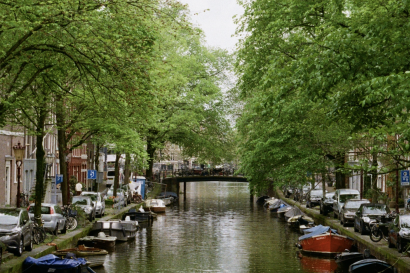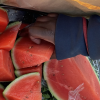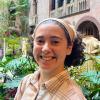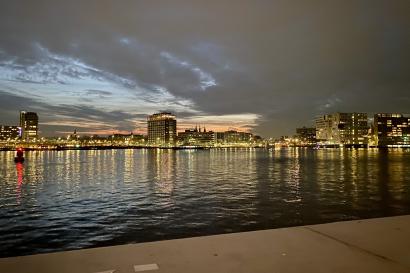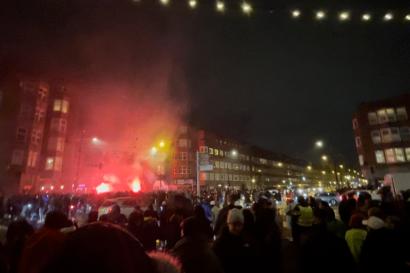
I have never cared as much about football as I have in the last two weeks. It is insane that the World Cup is occuring at the same time as our study abroad experience, and even though I never used to pay attention to the World Cup, or even professional sports in general, I feel pretty lucky that my study abroad semester and the World Cup lined up. I definitely would not have gotten the same exciting experiences, like being in a metro car shaking with the cheers of orange-clad, slightly drunk but contagiously happy Dutch people, if I were in America.
The Netherlands played the USA this past weekend of December 3rd and 4th. Throughout the week, I could feel the energy of the city revving up for the match. Orange flags and banners were strung in shop windows, some with the red, white, and blue letters of Hup Holland Hup! The day of, my friends and I went into center city to find a bar to watch the match. Knowing that places like Rembrandtplein would be packed, we tried to squirrel our way into a more local and small scale bar closer to the Social Hub West, in and around Oud West. The weather was brutally cold when we started our search; in fact, all weekend the sky remained the same nothingness shade of gray and the same snow-worthy level of freezing. We tried a cafe bar right off of one of the tram stops, hurrying past the curtain over the door to block the cold, but immediately it was clear this wasn’t where we were supposed to be. Everyone inside was dressed head to toe in orange, some with scarves and sweaters, others with face paint and wigs. My friends and I were in that bar for less than a minute before we went back out into the cold. We looked inside one more place in Oud West that had plastic orange leis hanging above the door and decided we’d rather run the risk of trying to find a sports bar with at least a few more Americans than feel completely outnumbered by Dutch fans.
To be clear, I wasn’t really rooting for the USA team; I mostly went out to experience the energy of a whole city united over the outcome of a 90 minute football match. The fact that the Netherlands happened to be playing the USA on a Saturday night just made it more exciting. Odds were in favor of the Netherlands, but even if the USA did manage to win, I would have felt ridiculous celebrating a Netherlands loss in a city of Dutch people. I'd also read a number of articles about the human rights abuses in Qatar that dimmed my motivation to fully throw myself into the tournament. I don't think I could write anything about the World Cup without fully acknowledging Qatar's horrific treatment of migrant workers and human rights violations. I still watched some of the games, not without thinking about what went into the construction of the shiny arenas and clipped green fields, the workers who lost their lives, the vulnerable migrant families.
My friends and I tried to squeeze into Coco’s on Rembrandtplein, but not even halfway through the doorway we couldn’t move any further. We scoped out another bar across the street but the stern bouncer at the door started shaking his head when he saw us approaching. “Full," he said gruffly. If we didn’t find a bar in the next few minutes, I considered just catching the Metro home. Any sports game wasn’t worth freezing to death in the 2 degree weather. My friends and I managed to find some standing room in Smokey’s, a bar around the corner from Coco’s. We still felt like we were the only Americans in the room at first, but the disparity was less conspicuous. Trays and trays of massive beer pints and glasses were being passed from group to group. I counted seven TV’s live streaming kickoff. Just ten minutes in, Netherlands scored a goal that set off a roar of cheers across the bar, backed up by the bartender setting off an alarm from behind the bar. I identified another group of Americans when I noticed a few people remained sitting. They were exchanging looks with each other, a mix of amusement, embarrassment, and good riddance. I don’t think they had any stake in the game for the USA, just like us. When the Netherlands scored again, I couldn’t help but also cheer alongside the other Dutch people as the alarm blared out again. The USA’s goal at around 75 minutes was somewhat pathetic compared to how quickly the Netherlands managed to score minutes afterwards. The land of the free was completely blown out of the water. The bartender was having a field day with the alarm when the match ended, quick and easy. A Dutch guy standing behind us asked if we were American; when we said yes, he laughed goodheartedly, beer swishing over the rim of his near-full pint, “So sorry. So sorry!” They pulled us into their celebratory dance around the bar, chanting something in Dutch that conveyed the spirit of pure national pride and joy. I was happy that the Netherlands won; it meant that if the Netherlands continued in the tournament, we could go out and watch more matches, wholeheartedly cheering for the Netherlands.
After getting wrapped up in the excitement of the USA vs. Netherlands match, I found myself checking the standings and live updates on matches throughout the rest of the week. A few people in my seminar would prop their phones up with the live stream during the fifteen minute break. I didn’t even realize how much I’d gotten into the World Cup until my friend texted me, “Morocco is playing Spain right now and I want to go to Mercatorplein if they win”, and I knew immediately what it would mean if Morocco won.
I didn’t have a way to watch the match so I sat in front of my laptop, blasting music and reloading the stats page every two minutes. The overtime clock went up and up, the tiny green line dashing back and forth under the countdown. My friend kept sending me updates in the form of reaction texts, “AHHHHH”, “WHHAAAT” until finally he said, “You ready?” and we grabbed our bikes and sped down to the square at Mercatorplein, heart of the Moroccan neighborhood, to witness how Morocco, the biggest underdogs in the World Cup 2022, would celebrate their fight and victory over Spain.
I heard the honking the second the game ended. At the roundabout down the street from the hotel, cars were circling, people leaning all the way out of the windows, waving the Moroccan flag, driver keeping his hand on the horn. Families crowded on their balconies on the street towards Mercatorplein, the Moroccan flag waving from the hands of shouting kids. People were making their way to Mercatorplein in the loudest way they possibly could. We parked our bikes on the outskirts of the growing crowd. Men, women, kids of all ages were storming the intersection, chanting and igniting flares. Parked horizontally on all four streets were police vans, police in highlighter vests lined up on each side of the street. There were already what looked like almost a hundred people on that one block, crowded onto the four corners of the street, no one brave enough yet to step out into the street. We were all standing around waiting, for what we didn’t know, but we’d know the signs. When Morocco beat Belgium 2-0 on November 27, no one expected people in the neighborhood to park a rental car in the middle of the Mercatorplein intersection and set it on fire. There is still a black scorch on the pavement. That’s what it felt we were waiting for; a flash, a spark, a bright catalyst for the rest of the night to go up in smoke. All of us crammed the edges of the sidewalk, looking around as the Moroccan flag was raised and swung with slow, deliberate emphasis over the heads of the crowd. Boys wearing the flag wrapped around the bottom half of their faces wove in and out of the crowd, eyes low and confident like their country’s victory and flag concealing their face made them immune to police scrutiny. Others wore the flag like a cape, or wrapped around their neck, letting it fall down their chests. Everyone’s chin was high. Everyone was seeking out another person to celebrate with, eyes lighting up when a connection was made and chants taken up.
We were standing on the southeast corner of the intersection when everyone started to rally around a car, speakers booming with music, giant red flag stretched across the hood, parked right in the crosswalk. One man sat in the passenger window, his entire body obscured by the giant red field and green star of Islam he held before him. There was an uproar as everyone caught on that the celebration had officially started. Someone nearby lit the first flare, flame red, and aimed it up at the sky. A boy who couldn’t have been more than six years old was hoisted onto his father’s shoulders, the flag tied tightly around his shoulders. His tiny silhouette against the flashing red smoke was a beacon around which everyone gathered, phones and fists in the air. Their chants were so filled with fervor, the powerful plumes of breath that swung into the cold air. The crowd moved as one, a sea of red and black. More and more people showed up on bikes and mopeds, engines revving, the blaring of the car horn neverending. A woman with curly hair, her handbag casually swinging around her shoulders, her water bottle in one hand, danced up to me and exclaimed, “We did good tonight!”
When the first explosive went off, everyone was celebrating so hard the ground-shaking explosion sent a jolt through the crowd, which ultimately only intensified the celebrations. When a firecracker went off on the ground, yellow gray smoke levitating off the wet pavement, the crowd would list to one side, thrilled and frightened by the light and sound. Firecrackers shot into the air would wheel over raised faces and go off with a snap, the tail of golden sparks ricocheting into the dark blue space between the tram lines. The center of the crowd moved around the intersection, people gravitating to where the chanting was the loudest, the fires the brightest, the energy the highest. You knew when a firework was about to go off because suddenly everyone would turn tail and run, and right after the explosion, shadows flashing briefly on the ground, the crowd would regroup and surge back inwards. After the first three or four ground-shaking explosions, I could no longer handle being in the middle of the intersection. I found a safe but near enough vantage point with other wary onlookers on the outskirts, standing on a bar stool from an outdoor cafe. The police vans prowled back and forth across the street, forcing back the crowds, but their intimidation was futile. I could see the waves of red and black moving to the chorus of honking, chants, explosions, and shouts. A man standing midway in the street lit a smoke flare, the red smoke pouring over his shoulders. Firecrackers flickered and sped through the streets, almost with a mind of their own, their spectacle interspersed with crowd surges announcing another grenade. Real fireworks, grand and colorful, were let loose between two apartment buildings, showering down green, red, and gold sparks on the tireless crowd. At one point a kid, maybe thirteen or fourteen, one flag around his neck and another swaying on a pole in his hands, saw my friend with his camera and came up to us, shouting, “Where are you from!” “America!” we shouted back, and the kid laughed. “Netherlands beat you bad!” We couldn’t disagree. He said, with a proud flourish of his flag, “Morocco is the best at everything!”
The energy of it all was infectious. Every person who looked at me had the biggest smile on their face, a light in their eyes. There was this intangible sensation of exhilaration followed by unity and pure, pure happiness. Morocco is the first Arab nation to make it to this stage of the tournament. The fact that the match went into such a large amount of overtime and penalty kicks meant that Morocco put up quite a fight against Spain, who were the World Cup champions in 2010. I couldn’t believe it when I saw the number of blocked penalty kicks go up, 1, 2, 3, until finally the match ended and history was made. Even if Morrocco loses against Portugal on Saturday, the feat of making it to quarterfinals is still worth all the fire and noise.
When we finally left Mercatorplein, it wasn’t even 9 p.m. The celebrations looked far from over; if anything, everyone got louder. Firecrackers illuminated our backs as we crossed back to where we parked our bikes. I don’t doubt that the Moroccans continued to celebrate long after we made it back to the hotel. Hours after we’d left, I could still hear the explosions, the honking, the scream of the fireworks, the sirens of police cars, the speeding car tires over wet pavement, all underscored by the embodied, proud, swelling proud chorus of a neighborhood brought together by their country’s victory.
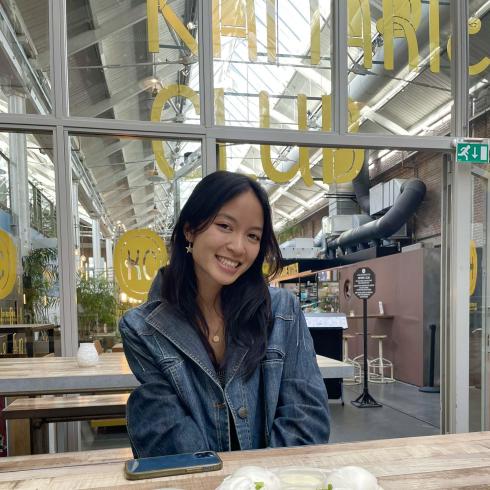
Emma Basco
My name is Emma Basco and I am originally from Sacramento, California. I am currently studying literature and writing at Sarah Lawrence College in New York. I love to read on the beach, doodle on post it notes, paint with watercolors, and unearth new cafes and restaurants. My hidden talent is that I can make an excellent pot of noodles from packaged ramen.
